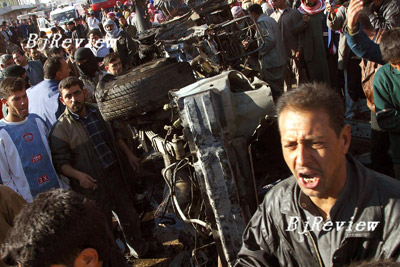|
 Despite the intense controversy and media frenzy it has caused, former Iraqi leader Saddam Hussein's death may only have a minimal impact on the situation in Iraq, some Chinese analysts believe. Despite the intense controversy and media frenzy it has caused, former Iraqi leader Saddam Hussein's death may only have a minimal impact on the situation in Iraq, some Chinese analysts believe.
Gao Zugui, Deputy Director of the Institute of Strategic and Security Studies at the China Institutes of Contemporary International Relations (CICIR), refrained from calling the execution of Saddam on December 30 a "turning point."
"No fundamental changes came from Saddam's arrest or death sentence," he said. "I doubt if his execution can have any significant effect."
It could be a "milestone" or a "watershed event" for the United States, though, he added. While downplaying the significance of the hotly contested execution, Chinese experts underlined the importance of reconciliation in the fragmented Iraq.
Tolerance matters
Gao acknowledged that the execution of Saddam would dash the hopes of his followers and prompt them to give up and join Iraq's political process. However, this effect was more evident when Saddam was captured in December 2003 because many expected that he would make a comeback before that, he explained. Since then, more and more people have been convinced that Saddam's era will never return, he said.
At the same time, Gao said Saddam's followers could be reintegrated only if the Iraqi Government led by Prime Minister Nouri al-Maliki carries out reconciliation across the country among different sects, forces and groups.
He pointed out that one of the major mistakes made by the United States in Iraq was that it outlawed Saddam's Baath Party and banned its members-high-ranking officials and ordinary members alike-from participating in the country's politics. If the Bush administration continues with this defective policy, many people will not be able to contribute to their nation's development even if they are willing to take part in the reconstruction, he warned.
Zhang Xiaodong, a research fellow at the Institute of West Asian and African Studies of the Chinese Academy of Social Sciences, echoed this view. He noted that Iraq has long been fragmented with its religious, ethnic and political complexities. What it lacks most is tolerance, something that enables all sections of society to bid farewell to the past and jointly build a unified, peaceful and stable Iraq.
Given the urgent need of reconciliation, Zhang was worried that the execution of Saddam might worsen the Iraqi situation in the long run as it could give rise to fresh conflicts.
Gao of the CICIR said a fundamental change in the Middle East hinges on a number of factors, such as whether the current Iraqi Government can endure and how well the Sunnis can get along with the Shiites. The hanging of Saddam will hardly result in such a change, he said.
A more reasonable goal
Gao said the Bush administration sought to have Saddam executed hurriedly partly because it wanted to show its determination to make a new start in 2007. For all the questioning about the legitimacy of the Iraq war, it at least succeeded in eradicating a "dictator," he said. As it put an end to a lingering concern at home, the Bush administration will have more maneuvering room when it adjusts its policy toward Iraq, he predicted.
Also, Gao believes it demonstrated the Bush administration's firm resolve to reconstruct the war-torn nation. With its original aim of turning Iraq into a model for "democracy" far from being fulfilled, it has compromised and switched to a more pragmatic goal, he noted.
Gao welcomed the positive changes that have taken place in Iraq since reconstruction began. For example, in the general election in December 2005, Iraqis turned out to be ready to use their ballots to elect a government that could represent them, he noted, adding that the order during the election was surprisingly good. A political framework has been established in Iraq despite the power struggle among different groups and the new framework is improving, he observed.
According to him, the present goal the Bush administration pursues in Iraq is to establish a democratically elected government capable of running the country. It no longer seeks a triumph in Iraq; instead, it is trying to make its failure less severe, he commented.
The United States is not expected to pull out of Iraq any time soon, experts say. Gao noted that most of the Iraqis are opposed to the invasion of foreign troops. In particular, they find it unacceptable that the United States interfered in the Saddam case, which should be the mandate of the Iraqi Government. However, they have to face up to the reality. As Iraqi forces are not strong enough to safeguard the country and protect its borders, they have to rely on U.S. troops to maintain security and stability. Without the presence of U.S. troops, Iraq would become a haven of extremists, Gao said.
In order to make a troop withdrawal possible, the United States is helping Iraq to train its security forces, Gao noted. Moreover, he stressed that the Bush administration and the Iraqi Government are both eager to reorganize the military and police forces disbanded after the fall of Saddam's regime. They are believed to be more competent than newly trained armed forces.
| 